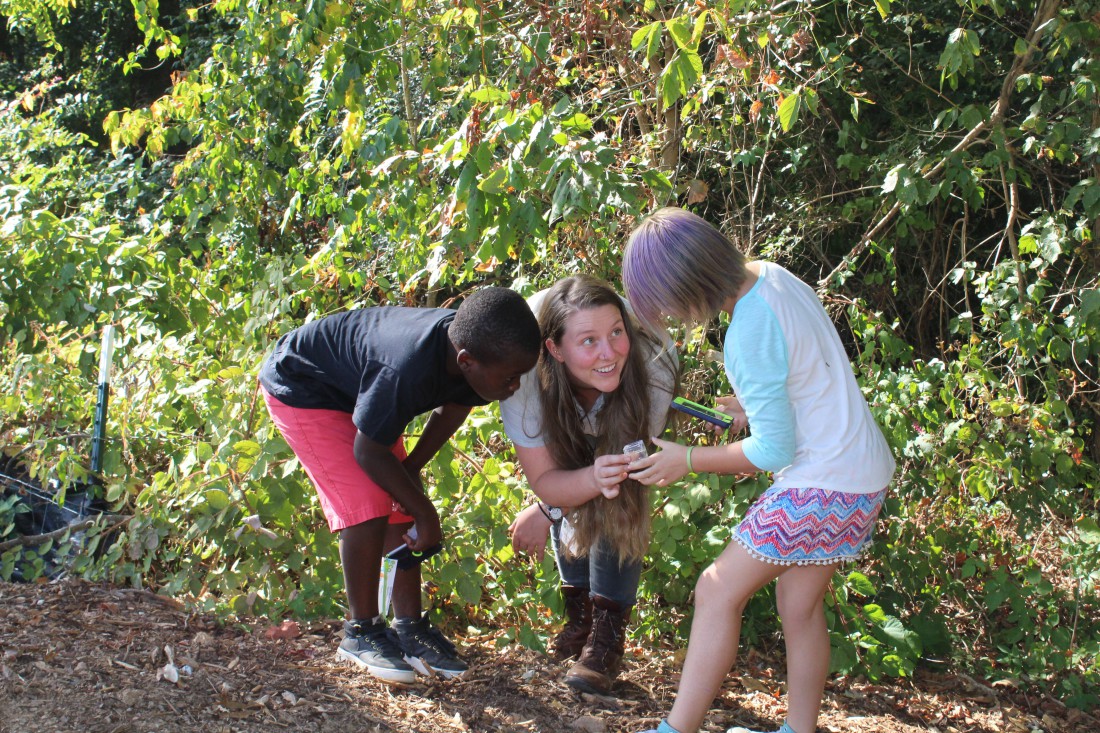For several weeks this past spring, Trudie Henninger led a class of kindergarteners outside to monitor and study the changes in nearby redbud trees. The process was slow. The kids grew restless. “They’re not doing anything, they’re not doing anything!” they insisted. But then one day, the whole class came running inside, chanting, “They’re blooming, they’re blooming!”
“I don’t think there’s anything more rewarding than that,” says Henninger.
Henninger’s passion for the outdoors began when a family friend took her camping. After that trip, her parents “couldn’t get me to come back inside,” she remembers. This desire to be outside has never left her. When she earned her degree in environmental science, Henninger had a second reason — to collect field data — to heed her natural inclination.
At the same time, her work with children at various nature centers across the state exposed her to the joys of instructing and inspiring youth. “I was really stuck for a long time,” Henninger recalls. “Do I go with environmental education or do I stick with field work?”
Luckily for Henninger, her position as citizen science coordinator at the North Carolina Arboretum allows her to do both. Her primary role is to work with children, gathering biological data outdoors that shows how climate change is affecting population densities, species occurrence and behavior changes. The information is shared with other citizen science projects across the country, including the National Phenology Network, Carolina Herp Atlas, Monarch Larva Monitoring Project, Box Turtle Connection, the eBird project and more.
Henninger began her work with the North Carolina Arboretum as an intern in 2011. The following year, she became an Olmsted Fellow, before joining the arboretum’s AmeriCorps Project Conserve program that September. Then, in 2014, she joined the arboretum as an environmental education specialist. It wasn’t until this year, however, that Henninger was offered the full-time position as its citizen science coordinator, which entails leading the arboretum’s citizen science-driven school-outreach initiative, Project EXPLORE (Experiences Promoting Learning Outdoors for Research and Education).
“She’s really into getting kids to connect with nature in a really personal way,” says Jonathan Marchal, youth education manager at the arboretum. “Not just understanding ecological concepts, but recognizing themselves as a part of the environment and a factor that can be incredibly positive.”
As a scientist, Henninger understands the importance of observation. She applies this method to her role as an instructor. Her aim is not to lecture, but to share and shape her material to students’ interests and needs. “I do my best to be a good listener,” she says. “I check in with students and learn their specific interests and help tie … that to the curriculum.”
In Henninger’s mind, it isn’t enough just to convey information. Her aim is to inspire interest. “I want to feed that curiosity and have [the students] ask lots of questions” — which she achieves through various creative means. One method she employs is a simple challenge through a game of numbers. “How many questions can you ask this tree?” she’ll say to her students and let the inquiries begin.
“She’s very into empowering people to take an active role in conservation,” continues Marchal.
This particular desire has spurred Henninger to help expand Project EXPLORE beyond the mountains, in order to reach as many children in the state of North Carolina as possible. “Getting kids outside, in their own school yards, knowing the plants and animals that are in their own neighborhood and across the state: That is my biggest goal. Anyone of any age can be a participant in the citizen science community. ”
BOTTOM LINE: Since 2013, Henninger has worked with over 5,200 children, showing them the importance of being citizen scientists.






Before you comment
The comments section is here to provide a platform for civil dialogue on the issues we face together as a local community. Xpress is committed to offering this platform for all voices, but when the tone of the discussion gets nasty or strays off topic, we believe many people choose not to participate. Xpress editors are determined to moderate comments to ensure a constructive interchange is maintained. All comments judged not to be in keeping with the spirit of civil discourse will be removed and repeat violators will be banned. See here for our terms of service. Thank you for being part of this effort to promote respectful discussion.